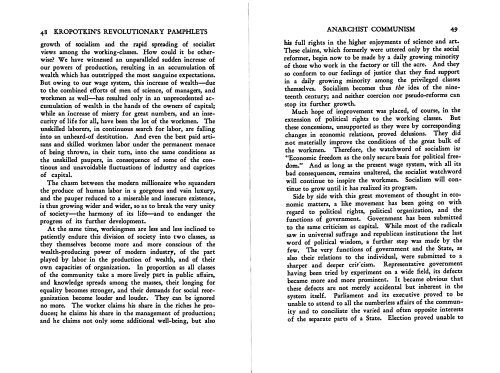Kropotkin's Revolutionary Pamphlets - Libcom
Kropotkin's Revolutionary Pamphlets - Libcom
Kropotkin's Revolutionary Pamphlets - Libcom
You also want an ePaper? Increase the reach of your titles
YUMPU automatically turns print PDFs into web optimized ePapers that Google loves.
48 KROPOTKlN'S REVOLUTIONARY PAMPHLETS<br />
growth of socialism and the rapid spreading of socialist<br />
views among the working-classes. How could it be otherwise?<br />
We have witnessed an unparalleled sudden increase of<br />
our powers of production, resulting in an accumulation of<br />
wealth which has outstripped the most sanguine expectations.<br />
But owing to our wage system, this increase of wealth--due<br />
to the combined efforts of men of science. of managers, and<br />
workmen as well-has resulted only in an unprecedented acculatio<br />
:, of wealth in the hands of the owners of capital;<br />
while an Increase of misery for great numbers, and an insecurity<br />
of life for all, have been the lot of the workmen. The<br />
skilled laborers, in continuous search for labor, are falling<br />
Into an unheard-of destitution. And even the best paid artisans<br />
and skilled workmen labor under the permanent menace<br />
of being thrown. in their turn, into the same conditions as<br />
the unskilled paupers, in consequence of some of the continous<br />
and unavoidable fluctuations of industry and caprices<br />
of capital.<br />
The chasm between the modern millionaire who squanders<br />
the produce of human labor in a gorgeous and vain luxury.<br />
and the pauper reduced to a miserable and insecure existence,<br />
is thus growing wider and wider, so as to break the very unity<br />
of society-the harmony of its life--and to endanger the<br />
progress of its further development.<br />
At the same time, workingmen are less and less inclined to<br />
patiently endure this division of society into two classes, as<br />
they themselves become more and more conscious of the<br />
wealth-producing power of modern industry, of the part<br />
played by labor in the production of wealth, and of their<br />
own capacities of organization. In proportion as all classes<br />
of the community take a more lively part in public affairs.<br />
and owledge spreads among the masses, their longing for<br />
equality becomes stronger, and their demands for social reorganization<br />
become louder and louder. They can be ignored<br />
no more. The worker claims his share in the riches he produces;<br />
he claims his share in the management of production;<br />
and he claims not Gnly some additiGnal well-being, but also<br />
ANARCHIST COMMUNISM ... ,<br />
his full rights in the higher enjoyments of science and art.<br />
These claims. which formerly were uttered only by the social<br />
reformer, begin now to be made by a daily growing minority<br />
of thGse who work in the factory or till the acre. And they<br />
so conform to our feelings of justice that they find support<br />
in a daily growing minority among the privileged classes<br />
themselves. Socialism becomes thus the idea of the nineteenth<br />
century; and neither coercion nor pseudo-reforms can<br />
stop its further growth.<br />
Much hope of improvement was placed, of course, in the<br />
extension of political rights to the working classes. But<br />
these concessions, unsupported as they were by corresponding<br />
changes in economic relations, proved delusions. They did<br />
not materially improve the conditions of the great bulk of<br />
the workmen. Therefore, the watchword of socialism is:<br />
"Economic freedom as the only secure basis for political freedom."<br />
And as long as the present wage system, with all its<br />
bad consequences, remains unaltered, the socialist watchword<br />
will continue to inspire the workmen. Socialism will continue<br />
to grow until it has realized its program.<br />
Side by side with this great movement of thought in economic<br />
matters, a like movement has been going on with<br />
regard to political rights, political organization, and the<br />
functions of government. Government has been submitted<br />
to. the same criticism as capital. While most of the radicals<br />
saw in universal suffrage and republican institutions the last<br />
word of political wisdom, a further step was made by the<br />
few.<br />
The very functions of government and the State, as<br />
also their relations to the individual, were submitted to a<br />
sharper and deeper crit"cism. Representative government<br />
having been tried by experiment on a wide field, its defects<br />
became more and more prominent. It became obvious that<br />
these defects are not merely accidental but inherent in the<br />
system itself. Parliament and its exec.utive proved to be<br />
unable to attend to all the numberless affairs of the community<br />
and to conciliate the varied and often opposite interests<br />
of the separate parts of a State. Election proved unable to

















